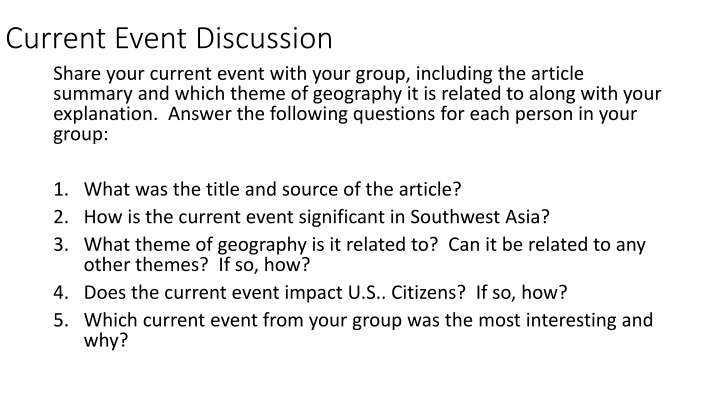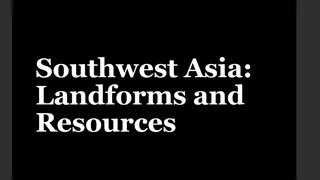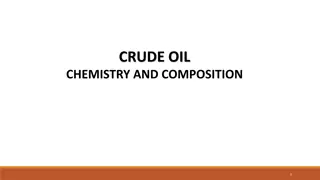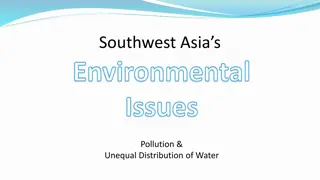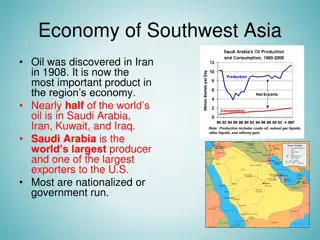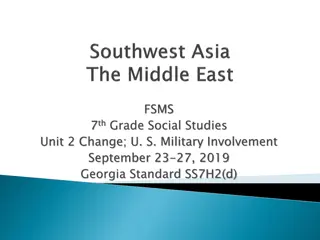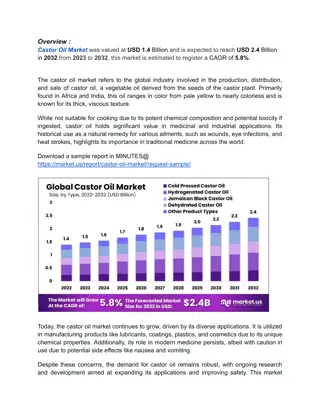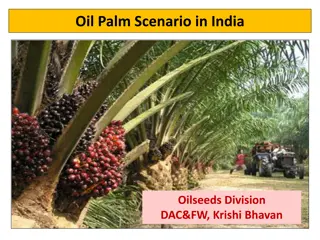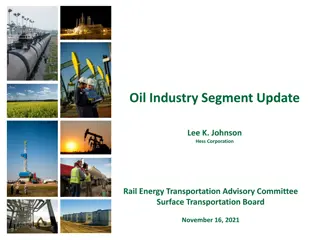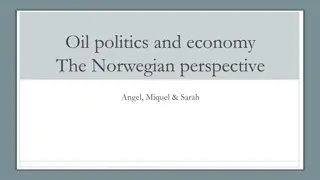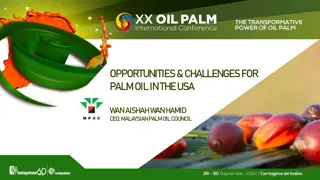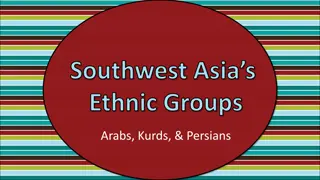The Influence of Religion and Oil in Southwest Asia
Southwest Asia, particularly the Arabian Peninsula, is significantly impacted by the interplay of religion, politics, and oil. The region's heavy influence of Islam, with practices such as the Five Pillars, has united its people culturally. Additionally, the discovery of oil in the region post-World War I has further shaped its geopolitical landscape. These factors have played a crucial role in the history and development of Southwest Asia.
Download Presentation

Please find below an Image/Link to download the presentation.
The content on the website is provided AS IS for your information and personal use only. It may not be sold, licensed, or shared on other websites without obtaining consent from the author.If you encounter any issues during the download, it is possible that the publisher has removed the file from their server.
You are allowed to download the files provided on this website for personal or commercial use, subject to the condition that they are used lawfully. All files are the property of their respective owners.
The content on the website is provided AS IS for your information and personal use only. It may not be sold, licensed, or shared on other websites without obtaining consent from the author.
E N D
Presentation Transcript
Current Event Discussion Share your current event with your group, including the article summary and which theme of geography it is related to along with your explanation. Answer the following questions for each person in your group: 1. What was the title and source of the article? 2. How is the current event significant in Southwest Asia? 3. What theme of geography is it related to? Can it be related to any other themes? If so, how? 4. Does the current event impact U.S.. Citizens? If so, how? 5. Which current event from your group was the most interesting and why?
What is this a picture of? What is its significance in Southwest Asia?
Southwest Asia Southwest Asia The Arabian Peninsula April 9, 2018 Essential Question: What impact have religion and oil had on Southwest Asia?
Religion, Politics, and Oil Religion, Politics, and Oil The Arabian Peninsula is heavily influenced by the religious principles of Islam. Islam a monotheistic religion based on the teachings of its founder, the Prophet Muhammad. By performing the 5 Pillars of Islam, the people of the Arabian Peninsula became united through the practice of similar culture.
5 Pillars of Islam 5 Pillars of Islam 1. Faith There is no God but Allah, and Muhammad is the messenger 2. Prayer Five times a day, facing the holy city of Mecca 3. Charity support the less fortunate by giving money 4. Fasting Muslims do not eat or drink anything between sunrise and sunset during the holy month of Ramadan. 5. Pilgrimage - a holy trip to Mecca at least once in their lifetime
The Spread of Islam The Spread of Islam Arabic language and Islamic teachings and culture spread across Southwest Asia from 632 750 CE. Muslim armies spread across three continents Asia, Africa and Europe.
Colonial Powers Take Control Colonial Powers Take Control Much of Southwest Asia fell under the control of France and Britain after World War I. The region was valuable because of the Suez Canal (vital link between colonial holdings in the rest of Asia and European ports) and because oil was discovered there in 1932. Saudi Arabia, however, was not colonized.
Oil Dominates the Economy Oil Dominates the Economy The principal resource in the economy of the Arabian Peninsula is oil. Arabian Peninsula countries make almost all of their export money and a large share of GDP from oil. 1960 a group of oil-producing nations, including Saudi Arabia and Kuwait, established an organization to coordinate policies on selling petroleum products. OPEC (Organization of Petroleum Exporting Countries)
The Change to Urban Life The Change to Urban Life Southwest Asia became much more urbanized because of their dependence on oil in the region. Countries began to focus more on the education of technical skills that would contribute to the economy.
